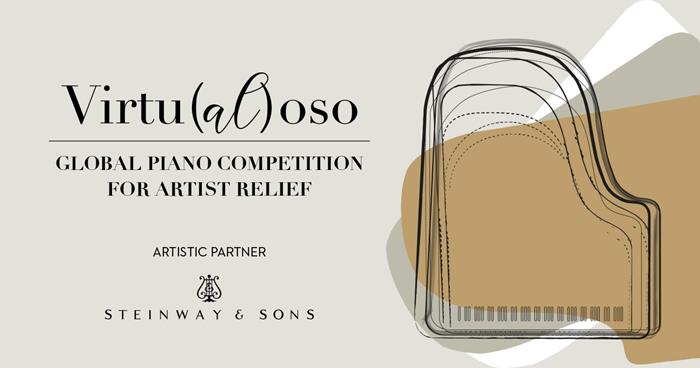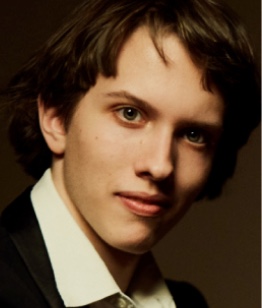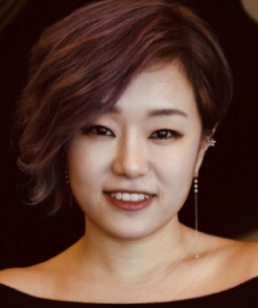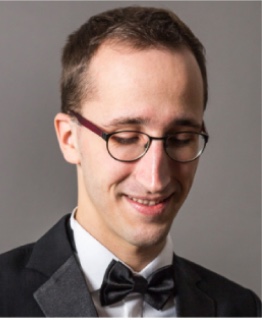by Daniel Hathaway

We caught up with all of them either by email or Skype to ask versions of these questions:
1) Waiting is always a part of competitions, but this one is unusual. How did it feel to have so long to wait between recording your program and having it streamed in the First Round.
2) Did you listen to yourself in the first round? What was that like?
3) Do you plan to listen to yourself in the final round?
4) What’s your favorite piece in your final round program, and why?
5) Based on your experience with Virtu(al)oso, if the pandemic continues well into the future, would you consider entering a virtual competition again?
FRIDAY, AUGUST 7 at 7:00 pm

She didn’t mind the wait between rounds. “It felt amazing as I had a wonderful vacation in Venice during that gap.”
She did listen to herself in the first round, and plans to listen to the final round as well. “It felt as if I were listening to my recording from a live competition. To be honest, I am always very critical of myself and I am rarely satisfied. I’m always trying to find something new to improve and then to produce the same piece in a slightly different way next time.
As for her favorite piece, Salimdjanova wrote, “I feel closely connected to both pieces I am presenting, so it’s really difficult for me to identify which piece is my favorite. Usually, each piece I am learning is the one I am trying to get into.
And yes, she would consider entering a virtual competition again. “That is a different reality indeed. But in my opinion, nowadays, that is the only possible form for us as artists to be heard and share our music with the audience. This is a great solution while facing all the difficulties connected to the pandemic. I am extremely grateful to the Piano Cleveland team for organizing this wonderful virtual competition and it is always a pleasure to be a part of such a well organized high professional event.”

On the subject of waiting, Gusev wrote, “Whenever I participate in a competition, I like to concentrate on the next things I am excited to do. In this case, I did my best to leave all the process of waiting aside and immediately turned to other activities: composing and practicing new pieces.”
Yes, he did listen to his first round performance. “I believe that any stage experience moves an artist forward, as his last step becomes a new starting point. When I listen to my past performances or past compositions, I like to learn from those experiences but I always feel I am already a very different person, even if I am watching a recording on the same day. On the stage, time goes so much faster, and one second there is worth several days in offstage life.”
And the final round? “I am more excited to listen to my colleagues — but I might watch my recording as well!”
Gusev was reluctant to name a favorite piece. “I am always in love with each piece I am playing, otherwise I am not able to learn it adequately. For me, each piece from the final round has its own world, and when I put them together I wanted to create a single indivisible listening experience for the audience.
And although it’s not his medium of choice, he’s willing to adapt to competing online. “I find any live performance much more desirable and exciting than a virtual one, but the times usually have no mercy, and I will do my best to adjust to the new circumstances.’

Fukami said she was a bit nervous recording her sessions because, unlike recording a CD, there would be no retakes. “But London Steinway’s people were so warm and so professional that they made it very comfortable.” The wait time before her first round session was streamed was filled with other Virtu(al)oso events. “The opening ceremony, the online meet-up party with other participants, etc. raised my spirits even before the broadcast.”
Listening to the First Round, she said, “I was able to experience the preciousness of this competition and I was very happy to exchange opinions with multiple pianists. I was thinking that the most important message of this competition is that we will overcome this crisis together with the power of music. I wanted to deliver light and peace through the universal language of music, especially in this pandemic period.” She added, “I was impressed by the quality of the recording, lighting and video. I would like to express my sincere gratitude to the recording teams.”
Fukami said that watching her introductory video made her laugh, “because I’m not a native English speaker.” She thought it was strange and tense. She said that she will listen to the Final Round on the archive. She recalls feeling a bit tired because she recorded the two rounds with no break, but she’s very pleased to share her performance with the audience.
She said she likes all the works in her Final Round. She tried to select pieces that were “rich, with hidden passion,” and displayed a Japanese aesthetic — like the Debussy Etude. Debussy was an admirer of Chopin, whose Etudes will close her program. In between, the Ichiyanagi work “expresses transient beauty.”
Fukami doesn’t know if virtual competitions are in her future, but she said that she’ll certainly continue to perform online to connect with audiences who may not be able to come to a concert hall. “During the lockdown, I gave a concert for a hospital team from my home. It’s different from a live concert where we can really feel the atmosphere together, but if I can communicate with audiences through online concerts. I think the experience will lead us to advance through the power of music.”
SATURDAY, AUGUST 8 at 7:00 pm

Kim was ambivalent about the wait time between rounds. “Not being able to check my performance right away was good and bad. Of course I was curious about how it went, but it gave me some time to get relaxed about the outcome.”
Did she listen to herself in Round One? “Ha-ha, it’s yes and no. I decided not to listen but I couldn’t resist! So, I went online and lowered the volume as far as possible and just enjoyed watching the awesome videography.”
She might do the same for the Final Round: “Half listening and half watching!”
Her favorite piece for the finals? “That’s a hard question. I admire Rachmaninoff for his musical language. Also, I enjoyed working on the Serpent’s Kiss by William Bolcom. Recently, I created a video project of this piece with animation added to it. This piece gets me full of imagination, it’s so inspiring!
And she’s very positive about performing virtually. “It’s like a completely different path for competitions. I feel more relaxed, and surprisingly, the engagement with audiences was even stronger! It’s all thanks to the well-planned competition organization. This way, I feel like I am really showing who I am as a person not only as a pianist on the stage.”

Bartlett was of two minds about the waiting. “There was a great sense of anticipation and excitement in the build up to it being broadcast, paired with a sense of relief that the nerve wracking part had already happened. I had a couple of sleepless nights wondering whether it would sound the same as I remembered it!”
Sleep was also a factor in listening to his First Round. “As the time difference for the live broadcast is quite substantial, I sadly had drifted off to sleep before my hands even touched the keyboard! However, it was lovely to wake up and listen back. I was particularly impressed with the professional quality of the audio and video.”
And he will definitely tune in for the Final Round. “I am imposing a strict regime of caffeine in the run up to the Final, in the hope of remaining conscious throughout!
Bartlett was hard put to choose a favorite piece from his Finals playlist. “There are so many moments that resonate with me throughout the final programme. I am particularly drawn to the wit and cheekiness in the Scherzo of Beethoven’s Sonata No. 18 — also the way that Scriabin paces the tremendous build up in his 4th sonata, culminating in a sublime, soaring finale.”
And would he play in another all-online contest? “I would most certainly be very interested, as I have greatly enjoyed every moment of this competition experience. It has been a tremendous privilege to meet, albeit virtually, all of the wonderful organisers and musicians involved — however I’m keeping my hopes up that there’s light at the end of the tunnel for us all, sooner rather than later!”

I reached him in his hometown in Croatia, and because I didn’t have the opportunity to interview him before Round One, I started by asking about what his life has been like since mid-March.
“All musicians are facing difficult times, but the corona epidemic was just starting when we had a terrible earthquake in Zagreb where I live during the year — something like 5.6 on the Richter scale. Luckily it happened at 6 in the morning so there were no people on the streets.” Then all of his concerts in April and May were cancelled.
Marušić had already been accepted into the Cleveland International Competition this summer, so when that was cancelled and Virtu(al)oso was organized in its place, he leapt at the opportunity to apply. “OK, this is perfect,” he thought, and having now experienced it, he said “I’ve never seen anything so professional online.”
In Cleveland, he’s also happy to follow in the footsteps of 2009 CIPC gold medalist Martina Filjak, a fellow Croatian. “We know each other really well.”
Having recently started teaching in Zagreb, he imagined himself on the jury during the First Round, and having to listen objectively to the performances. “Listening to others is the best way you can learn from a competition.” He finds it more difficult to listen to himself, so he enlisted his girlfriend as a de facto juror. “It was interesting to see who passed into the finals. I guessed two of them and she guessed three.”
His favorite piece in the Final Round is Schumann’s Kreisleriana. “It contains everything. For me it’s the most genius piece in Romantic music. I fell in love with it, and I really can’t explain why. In a way, Schumann was crazy, and you can really hear that in the music.”
Does Marušić find it difficult to perform without an audience? “Of course, you don’t have the feeling you get when people are clapping: ‘OK, maybe that wasn’t so bad.’ But in the end we were all facing the same conditions.”
Published on ClevelandClassical.com August 7, 2020.
Click here for a printable copy of this article


